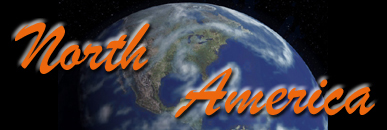

Text and photos courtesy of Michelle Mock and Stephanie Wong
17th Century
Through the 17th Century, more and more Europeans would come to North America. The Spaniards started exploration of the coast of California while the French began to colonize Newfoundland, Acadia (Nova Scotia) and New France (eastern Canada).
The earliest French settlements were at St. Croix and Port Royal, along the Bay of Fundy, in the region called Acadia. In 1606, the first permanent English settlement was established in Jamestown, Virginia. In 1608, Samuel de Champlain, know as the "Father of New France", founded the first permanent settlement at Québec (City). In 1609, the Dutch found Manhattan. Henry Hudson continued searching for a passage to Asia and explored the Hudson Bay. In 1612, tobacco began to be cultivated in Virginia. A few years later, in 1619, the first slaves from West Africa were brought to Virginia.
In 1620, more than 100 years after Columbus landed in America, the Pilgrims arrived in Massachusetts aboard the Mayflower. The first "Thanksgiving" meal was held. Throughout this century, wars would break out as individuals staked claims for their country. Some were small skirmishes, others were on a much larger scale. Europeans (Dutch, English, French, Spanish and others) would fight amongst themselves and with the native peoples who defended their land and way of life.
The fur trade flourished during the 1600s. Many animals, including the stoat, beaver and otter, were hunted for their fur. In 1642, the French founded Montréal, Canada. The French also created settlements in the Caribbean Islands (St. Martin, St. Bartholomew, St. Croix, The Saints, Maria Galante, St. Lucia and Grenada) in 1648. By 1650, 60,000 European settlers had made America their home.
Qué bec became the capital of New France in 1663, and soon King Louis XIV took interest in colonizing the area. In 1665, England got New York and New Jersey from the Dutch. North America's first corporation, the Hudson's Bay Company, was given exclusive trading rights and ownership of Rupert's Land (the large tract of land west and surrounding Hudson Bay) by Kind Charles II of England in 1670. In 1674, plantations in Quebec, Canada became French Royal Colonies. War between settlers and the natives continued.
French Explorer, Robert de la Salle, founded St. Louis in 1682 and took the Mississippi Valley. In 1699, the French founded Louisiana. In 1683, an English Quaker, named William Penn, founded the colony of Pennsylvania. William Penn also made a treaty with the natives to keep peace in Pennsylvania. In 1688, German Quakers in Pennsylvania were the first to make anti-slavery protests.
For the next few decades, the English and the French would be at continuous conflict over the lands of North America.
| Home | Contact Us | Credits | Sitemap |
© 2006 - Imagiverse Educational Consortium